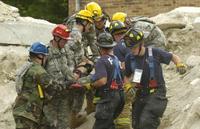-
Prison systems vulnerable to cyberattack

At the recent Hackers Halted convention in Miami, researchers John J. Strauchs and his daughter Tiffany Strauchs Rad told the audience how with only $2,500 and some basic equipment, they were able to develop a cyberattack on a simulated prison computer system with potentially catastrophic results
-
-
New Jersey first responders prohibited from taking crash scene photos
New Jersey lawmakers are currently considering a bill that would make it illegal for first responders to take pictures or videos of an accident and distribute them without the permission of the victim’s family; under the proposed law, any first responder who circulates an accident photo or video without permission could face as much as eighteen months in jail or a $10,000 fine
-
-
Operation Vigilant Guard tests Arizona disaster response

More than 250 agencies and 8,000 emergency personnel recently participated in “Operation Vigilant Guard,” one of the largest emergency response exercise in Arizona’s history; participants were forced to respond to two scenarios — a catastrophic flood and the detonation of a ten-kiloton Improvised Nuclear Device (IND) in the Phoenix metropolitan area
-
-
Better hospital responses to terrorist attacks

Terrorist attacks are less likely to occur than other disasters, but they can have greater impact on hospital operations; until the 9/11 and anthrax attacks, hospital emergency preparedness programs had not included provisions for terrorism events; those attacks changed that, but there is still much that should be done
-
-
DHS agents recover painting stolen by Nazis

Last week, federal DHS agents raided a museum in Tallahassee, Florida to recover a 500-year-old painting that was believed to be stolen by Nazis during the Second World War; upon receiving a tip from a foreign law enforcement source that the painting had been stolen by the Nazis, DHS agents seized the painting and will hold it until the rightful owner can be determined
-
-
Budget cuts force military contractors to look inward for business

With U.S. military operations overseas drawing down and the U.S. defense budget likely to shrink , contractors are increasingly looking to domestic markets for their products
-
-
DHS to broadcast first ever nationwide EAS test
Yesterday at 2 PM eastern standard time, the first ever nationwide Emergency Agency System (EAS) test took place, in an effort to help strengthen the effectiveness of the EAS as a means of notifying the American public of emergencies and potential dangers both regionally and nationally
-
-
One answer to the National Drug Threat Assessment Report: It’s the human component, stupid // by Lee Maril

The recent Department of Justice study of the impacts of illegal drugs upon our country, the National Drug Threat Assessment 2011 (NDTA2011), outlines significant challenges facing Customs and Border Patrol (CBP); a first step to directly addressing the NDTA2011 is to refrain from sending out a new batch of RFPs (request for proposal) to the usual defense contractors
-
-
Training mission showcases Israeli counterterrorism techniques
A group of U.S. law enforcement officials recently concluded a weeklong training seminar on the methods Israel uses to prevent and respond to terrorism
-
-
Detergent suicides on the rise
The incidence of chemical suicides has been steadily increasing in the United States since its first appearance in 2008; it is believed the statistics are incorrect because of underreporting; most such suicides provide warning of the toxicity of the environment they will be found in, but not all do, making responding to these calls a hazard for all concerned
-
-
Ballistic clipboard protects police from gun fire
Routine traffic stops, warrant calls and first responses have the potential of being some of the most dangerous moments in the field; a standard issue clipboard provides little in the way of reliable protection in the event of gunfire; a new clip board provides multi-hit protection against gun fire
-
-
Highly-trained Indian K-9s join counterterror forces

The Indo-Tibetan Border Police (ITBP) has a highly-trained unit in its force unlike any other in the world; police handlers have taught six Labradors to carry explosives in their teeth, sneak into terrorist lairs, plant remote-controlled bombs, hide secret cameras, interpret body language, and understand English and Hindi
-
-
Local police not required to detain illegals for ICE

Internal DHS documents reveal local law enforcement agencies are not required to hold undocumented immigrants when requested by the federal government; a coalition of groups against the controversial Secure Communities program obtained a total of three documents under a Freedom of Information request that clarified the policy of detainers for local law enforcement agencies
-
-
Detroit police push for ShotSpotter
Detroit police chief Ralph Godbee is pushing the city to purchase a $2.6 million automated gun-shot detecting system that he believes will help reduce violent crime; last summer, Detroit was hit by one of its most violent periods in recent history with 254 shootings that left fifty-two people dead in two months
-
-
New York police officers equipped and ready to detect dirty bombs
Law enforcement officials operating in the New York City region are trained and equipped to intercept dirty bomb threats
-
More headlines
The long view
Why Was Pacific Northwest Home to So Many Serial Killers?
Ted Bundy, Gary Ridgway, George Russell, Israel Keyes, and Robert Lee Yates were serial killers who grew up in the Pacific Northwest in the shadow of smelters which spewed plumes of lead, arsenic, and cadmium into the air. As a young man, Charles Manson spent ten years at a nearby prison, where lead has seeped into the soil. The idea of a correlation between early exposure to lead and higher crime rates is not new. Fraser doesn’t explicitly support the lead-crime hypothesis, but in a nimble, haunting narrative, she argues that the connections between an unfettered pollution and violent crime warrant scrutiny.
Bookshelf: Smartphones Shape War in Hyperconnected World
The smartphone is helping to shape the conduct and representation of contemporary war. A new book argues that as an operative device, the smartphone is now “being used as a central weapon of war.”
